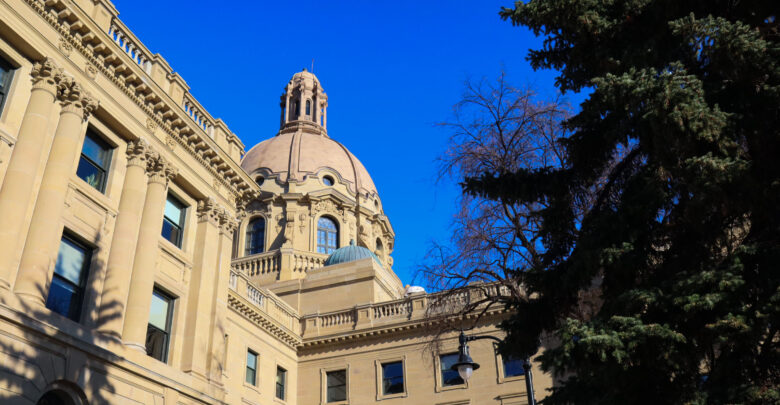The Alberta Next Panel: Good in theory, not in practice
Surveys promote democratic practices, but fail when its questions are biased towards one political party’s opinions.
 Leah Hennig
Leah HennigOn June 24, the Alberta government announced its Alberta Next Panel. Advertised as a “province-wide consultation,” it invites Albertan citizens to share their opinion on the provincial government’s plans to build a “stronger” Alberta. This may seem like a great opportunity to speak our minds, but the panel shows clear bias and refuses to consider other perspectives.
At first glance, the idea is admirable and promotes democracy. The Alberta government appears to be giving us the opportunity to speak up through in-person and virtual meetings about the provincial police force, Alberta pension plan, constitutional changes, immigration, and tax collection. Surveys are also available online for those unable to access the town hall meetings.
It may seem inviting, but the surveys clearly reflect bias and serious flaws.
“Your Voice Matters! Watch The Video [and] Weigh In With Your Thoughts” is how the Alberta Next Panel website advertises its surveys. But this advertisement fails to say that “weigh in with your thoughts” means choose how you agree with the Alberta government’s actions.
After watching the video for the “Provincial Police Force” survey, the first content question asks “What aspect do you like most about an Alberta Police Service?” This question is mandatory and gives three options to choose from.
It does not give the option to say “I do not approve of an Alberta Police Service” or an opportunity to write your own reason you approve of an Alberta Police Service.
The survey forces participants to answer limited, predetermined questions. We cannot skip a question, so we have no choice but to give a positive response to the government’s choices.
How can this survey ever be accurate if we have no choice to dissent?
The Alberta Next Panel clearly promotes a separatist agenda. It focuses on how to make a strong Alberta despite the “challenges that Alberta faces from Ottawa.”
The Alberta Police Service survey also demonstrates this. One of the questions asks, “What concerns you most about shifting from RCMP to an Alberta Police Service?” It offers three answer choices: potential start-up costs, the ability to hire officers and staff, and the likelihood that the Alberta Police Service will cost more in the long run than the current system.
None of these options mention concern about becoming more separated from the rest of Canada.
It is mandatory to choose a concern about the policy, but it can only be a government-approved concern.
Furthermore, the Alberta Pension Plan survey asks about the “risks of opting out of the [Canadian Pension Plan] (CPP).” It does not include an option about possible worsening of ties to the other provinces.
Without the opportunity, I’m unable to express my true opinion.
Alberta could only separate from Canada through a referendum approved by its people. Currently, there have not been enough citizens who have spoken up to even cause a referendum to begin. Premier Danielle Smith has pushed Bill 54 to lower referendum thresholds, despite most people showing no interest in separation.
Smith is manipulating our system to make fewer voices louder. She doesn’t want more voices heard; she wants the voices that agree with her heard.
This is evident in her choice of panel members.
The Alberta Next Panel includes voices chosen by Smith to “explore how Alberta can better assert its constitutional jurisdiction.” According to the website, this panel will include experts in law and economics, as well as elected officials.
A panel of experts makes logical sense. They would have the experience and knowledge to make these decisions that average citizens simply do not. An inequitable panel makes the experiences of its individual members meaningless.
When reading about the individual panel members, I found each member to be a respected expert in their fields of agriculture, economics, business, and more. But I also found that the panel was incredibly right-leaning.
There are three United Conservative Party of Alberta (UCP) Members of Legislative Assembly (MLAs) on the panel: Rebecca Schulz, Brandon Lunty, and Glenn van Dijken. As the current Alberta government is conservative, MLAs from the UCP should be on this panel. Their voices matter because they make decisions for our province as a part of a majority government, and represent the citizens of three constituencies: Calgary-Shaw, Leduc-Beaumont, and Athabasca-Barrhead-Westlock. Their voices are important and deserve a seat at the table. But their voices should not be the only ones heard.
There are 47 UCP MLAs in the Alberta government, but there are also 38 MLAS from the Alberta New Democratic Party (NDP). The UCP have the majority of seats, but they do not have them all. There are 87 MLAs in Alberta.
The NDP hold about 43.7 per cent of the 87 MLA seats, so why is there not even one NDP representative on Smith’s panel? Why is the Alberta Next Panel so restricted to one opinion?
Not only are other perspectives being excluded, but the moderators have shown pro-separatist sentiment instead of facilitating the conversation in a neutral way. An article from a Red Deer newspaper, rdnewsNOW, outlined how attendees of a Medicine Hat panel were unimpressed with the moderator’s bias and felt unheard about their concerns.
As Smith’s term continues, this confining mindset continues in Alberta politics. The government is moving forward with censorship in school libraries. Smith is trying and failing to restrict transgender youth from receiving gender affirming care. These are just two examples of how Albertans’ diverse opinions are ignored and pushed toward a single mindset.
We hear story after story about decisions being made for us. The Alberta Next Panel could have been an opportunity for all voices to be heard by the premier, but instead it’s become another platform for her side of the story.




